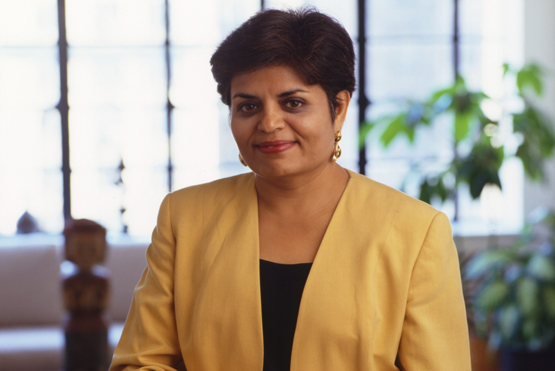The Clash of Culture and Commerce
Vishakha Desai talks about China, India at tonight’s Honors lecture

What happens when ancient cultures meet the new global economy? Vishakha Desai wants to find out.
Desai is president of the Asia Society, a global nonprofit educational organization dedicated to deepening connections among the peoples of Asia and the United States. She is exploring how the cultures of China and India are affected by the rapid economic growth in those countries.
“Most of the work that people do is to compare and contrast between China and India in economic and political terms, but not in cultural terms,” says Desai, who will deliver the CAS Honors Program annual lecture tonight at 7:30 p.m. “I wish to bring culture into this equation of the rise of these two countries, and how culture fits in their arena today.”
BU Today caught up with Desai to find out more about her lecture, The Future of Culture in the Age of Commerce: China and India.
BU Today: There is so much attention paid to the rapidly growing economies of India and China. What are you focusing on?
Desai: It’s interesting because today, when people think about China and India as rising powers, we almost assume that this rise in power is in the commercial sense, the economic sense. They are rising very fast, but when we really look at it, we have to recognize that these countries have young economies. In China’s case, from 1978 onward, and in India’s case, from 1991. But culturally, they are 5,000-year-old civilizations. So this growth that they both are undergoing, what does that do to their cultures and civilizations? And that’s the question I hope to explore.
How do you begin to explore their culture?
I will start by looking at it historically, within India and China, which were economic players in the 16th century, let’s say, or the 8th century, to see what was the role of culture then. Then coming back to now, the question is what is the role of culture today — and both of them have very different trajectories.
What responsibilities do China and India have to the global community?
With China and India, economic rise also means accepting certain responsibilities — as they gain power, they gain global responsibility. They need to look at how they are playing their part in international communities, not just for their national interests, but for the larger, global interests, like the environmental crisis. This is just as important as asking America how it will accommodate to a reality 20 or 30 years hence, when it won’t be the sole superpower.
I always say, the faster that America accommodates that reality — and the faster China and India recognize that by being major players they also have responsibilities — the better off the world would be.
What is the Asia Society doing to promote understanding of this issue?
We are embarking on an initiative that will be focused on culture in the age of commerce in Asia. It’s essentially looking at the investigation of changing cultural values in these rapidly modernizing societies.
How do you plan to carry out this initiative?
I think the first thing is to understand all aspects and issues with India and China and continue to explore them. The second thing is to then see how one can sustain, strengthen, or develop the right policies — especially with business. Today, we all talk about comprehensive development, but when we talk about sustainable development, many corporations still talk about it from the perspective of poverty, education, and not so much in terms of culture. And the argument I make is that culture is fragile, and when things disappear, you can’t bring them back. Once it’s gone, it’s gone. We have to think about sustainability; we have to include culture for these ancient civilizations.
But my goal is not to be romantic about the past. I’m not saying everything about the past has to be preserved. What I am saying is that we have to understand what is the role of the past for the future, and what are those arts and cultural values that we need to understand so that it’s not too late to preserve, change, and adapt.
This year’s CAS Honors Program annual lecture, The Future of Culture in the Age of Commerce: China and India, will be given by Vishakha Desai, president of the Asia Society, on Monday, September 15, at 7:30 p.m. at the Tsai Performance Center, 685 Commonwealth Ave. It is free and open to the public.
Kim Cornuelle can be reached at kcornuel@bu.edu.
Comments & Discussion
Boston University moderates comments to facilitate an informed, substantive, civil conversation. Abusive, profane, self-promotional, misleading, incoherent or off-topic comments will be rejected. Moderators are staffed during regular business hours (EST) and can only accept comments written in English. Statistics or facts must include a citation or a link to the citation.